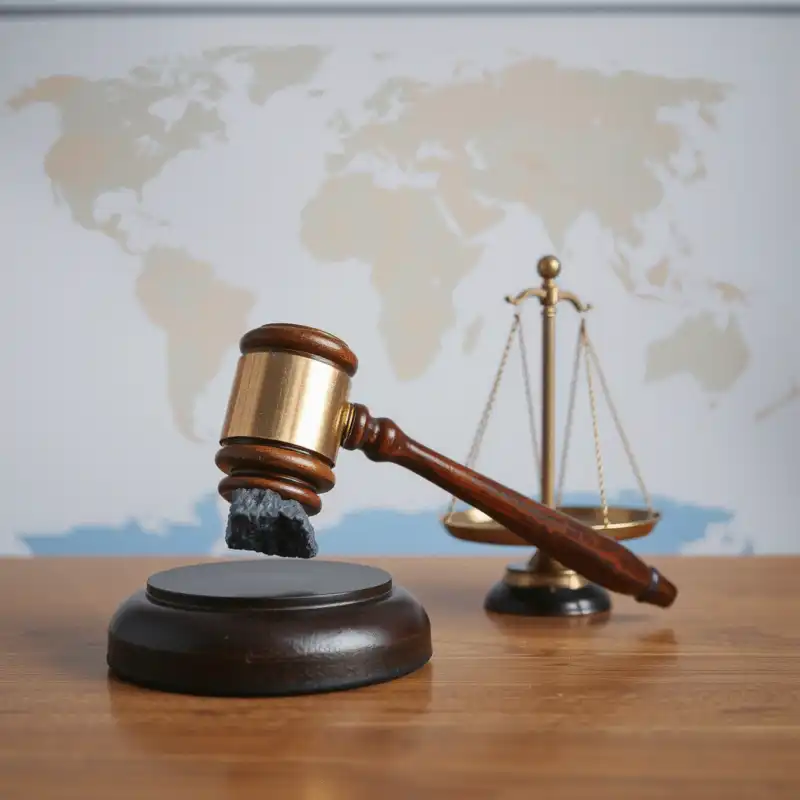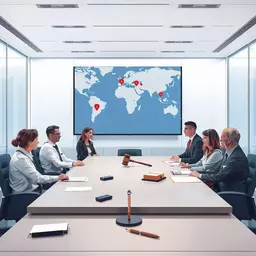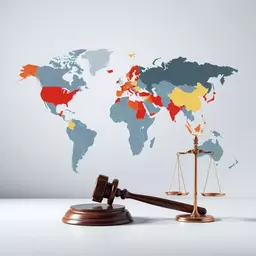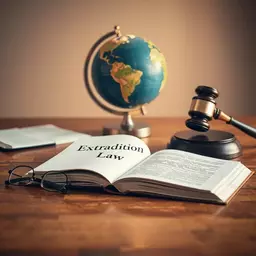Understanding Extradition and Cooperation

In a world where crime knows no borders, the importance of extradition as a tool for justice cannot be overstated. It reflects not just a legal obligation, but also the relationships of trust and cooperation between nations. As we delve into the intricacies of international legal cooperation, it becomes clear how these frameworks shape our global justice landscape.
What You Will Learn
- Extradition plays a critical role in promoting global justice by ensuring that criminals are prosecuted regardless of where they flee.
- International legal cooperation enhances relationships between nations, facilitating effective communication and streamlined processes in extradition requests.
- Human rights protection is a fundamental aspect of extradition, ensuring individuals are treated fairly throughout the process.
- Interpol's involvement in extradition includes issuing Red Notices and providing resources, enhancing the collaboration among member countries.
- Strong legal frameworks are essential for establishing mutual trust and clear guidelines in the extradition process, fostering accountability and justice.
- Future improvements in extradition can be achieved through streamlined procedures, better training for legal professionals, and increased transparency in the process.
- Engaging in dialogue and reform efforts is crucial for adapting extradition practices to meet the changing global landscape and ensuring effective justice is served.
Key Objectives of International Legal Cooperation in Extradition
International legal cooperation in extradition aims to enhance global justice through effective communication, legal frameworks, and human rights protections. Below is a summary of the primary objectives and their significance.
Facilitating Effective Communication
Streamlining extradition requests through improved communication between legal systems.
Enhancing Legal Frameworks
Implementing effective and fair legal structures governing extradition.
Protecting Human Rights
Ensuring individuals are treated justly during the extradition process.
Building Trust Among Nations
Establishing mutual trust to facilitate confident responses to extradition requests.
Understanding the Role of International Legal Cooperation in Extradition
In today’s interconnected world, the concept of extradition plays a critical role in the pursuit of global justice. It allows countries to cooperate in apprehending individuals accused of serious crimes, ensuring that they face justice regardless of where they have fled. As someone deeply involved in the intricacies of extradition law through Extradition Interpol UAE, I often see how vital this cooperation is in bridging the gaps between different legal systems.
When we think about extradition, it's important to understand that it goes beyond simply returning a fugitive. It’s a reflection of international relationships and trust between nations. The significance of extradition in global justice cannot be overstated, as it helps uphold the rule of law, deter criminal behavior, and protect communities around the world.
The Significance of Extradition in Global Justice
Extradition is essential for maintaining order and accountability across borders. It serves several key purposes, including:
- Promoting justice by allowing the prosecution of criminals no matter where they attempt to escape.
- Strengthening international relations by facilitating cooperation among countries.
- Deterring potential criminals from seeking refuge in jurisdictions with weaker laws.
In essence, extradition is a tool for fostering a safer global environment. It reflects the commitment of nations to work together against transnational crime, which is increasingly important in our globalized society.
Primary Objectives of International Legal Cooperation
The primary objectives of international legal cooperation in extradition can be summarized as follows:
- Facilitating effective communication between legal systems to streamline extradition requests.
- Enhancing legal frameworks that govern extradition to make them more effective and fair.
- Protecting human rights during the extradition process to ensure that individuals are treated justly.
By focusing on these objectives, countries can work more effectively together, ensuring that the extradition process is both efficient and just. At Extradition Interpol UAE, I emphasize the importance of these goals in the context of international law, as they lay the groundwork for better cooperation and understanding. For instance, understanding how extradition navigates legal cooperation can significantly streamline these processes.
The Role of Interpol in Extradition
Interpol plays a pivotal role in the extradition process, acting as a facilitator for international police cooperation. Its involvement is crucial for several reasons, including:
- Issuing Red Notices, which are requests to locate and provisionally arrest an individual pending extradition.
- Providing critical information and resources to member countries to support their extradition efforts.
- Ensuring that international norms and standards are upheld throughout the extradition process.
As someone who navigates the complexities of these processes, I can attest to the significance of Interpol's work. Their commitment to enhancing global security works not just for law enforcement, but for the common good, ensuring that justice is served regardless of borders.
Engage with Us!
As we delve deeper into the complexities of extradition and international legal cooperation, we want to hear your thoughts:
What do you believe is the biggest challenge facing extradition practices today?
Summarizing Key Insights on International Legal Cooperation in Extradition
As we reflect on the intricate world of extradition, it's essential to recognize the pivotal role that international legal cooperation plays. This cooperation is the foundation of a global justice system that seeks to ensure accountability across borders. In my experience at Extradition Interpol UAE, I've observed that strong legal frameworks are not just beneficial; they are crucial for fostering understanding and trust among nations.
With a focus on clarity and integrity, we can appreciate how legal structures guide extradition practices. This underscores the significance of treaties, conventions, and mutual legal assistance agreements. These frameworks not only streamline the extradition process but also enhance the effectiveness of collaborative efforts, ensuring that justice prevails, even when individuals cross international boundaries.
To further elaborate on this, consider how extradition cases shape UAE law, reflecting the dynamic interplay between international legal standards and domestic legal systems.
Recapping the Importance of Legal Frameworks in Extradition
Legal frameworks surrounding extradition serve multiple critical functions. They establish mutual trust, set clear expectations, and provide a legal basis for extradition requests. Here are some key highlights:
- Trust Building: Legal frameworks help to build trust among nations, ensuring that countries can act confidently when responding to extradition requests.
- Clear Guidelines: They provide guidelines that govern how extradition requests are made and processed.
- Protection of Rights: Legal frameworks often include provisions to protect the rights of individuals facing extradition.
These principles are essential not only for the functioning of the legal system but also for safeguarding human rights. The blend of cooperation and legal rigor that these frameworks offer can lead to more effective and fair extradition processes.
Future Perspectives on Enhancing International Cooperation
Looking ahead, there are promising avenues to enhance international cooperation in extradition matters. As legal experts, we must advocate for reforms that adapt to the changing global landscape. Here are some areas we should focus on:
- Streamlined Processes: Advocating for streamlined procedures can help reduce delays in extradition cases.
- Training and Resources: Providing better training and resources for legal professionals involved in extradition can improve outcomes.
- Increased Transparency: Promoting transparency in the extradition process can alleviate concerns and foster better relations among nations.
As we engage in these discussions, it’s vital to include legal practitioners, policymakers, and international organizations to drive meaningful change. At Extradition Interpol UAE, we see the potential for progress when stakeholders come together to address these challenges! The importance of responding to an Interpol Red Notice effectively cannot be overstated in this context.
Encouraging Dialogue and Reform in Extradition Practices
Dialogue is vital for fostering understanding and reform in extradition practices. As I’ve learned through my work, the more we communicate about the challenges and successes we face, the better we can adapt our systems to meet the needs of justice. Open discussions can lead to innovative solutions that bridge gaps in cooperation.
FAQs About International Legal Cooperation in Extradition
What is the main goal of international legal cooperation in extradition?
The main goal is to enhance global justice by ensuring that criminals are prosecuted regardless of where they flee, achieved through effective communication, legal frameworks, and human rights protections.
Why is extradition important for global justice?
Extradition is essential for maintaining order and accountability across borders. It promotes justice, strengthens international relations, and deters potential criminals from seeking refuge in other jurisdictions.
How does Interpol support the extradition process?
Interpol facilitates international police cooperation by issuing Red Notices, providing critical information and resources to member countries, and ensuring that international norms and standards are upheld throughout the extradition process.
What role do legal frameworks play in extradition?
Legal frameworks establish mutual trust, provide clear guidelines, and protect the rights of individuals facing extradition, ensuring that the extradition process is both efficient and just.
What are some future perspectives for enhancing international cooperation in extradition?
Future improvements include streamlined processes, better training and resources for legal professionals, and increased transparency to reduce delays and foster better relations among nations.
Why is engaging stakeholders important for extradition reform?
Engaging legal professionals, policymakers, and citizens is essential for sharing insights, advocating for improvements, and creating a more just and effective extradition system that prioritizes both the rule of law and human rights.
The Role of International Organizations in Extradition Reform
International organizations, such as the United Nations and Interpol, play a critical role in shaping extradition practices worldwide. They help standardize legal processes, promote best practices, and facilitate collaboration among member states. Here’s how they contribute:
- Standardization: Establishing norms and protocols that streamline extradition.
- Training Programs: Offering training and resources to enhance the skills of legal professionals.
- Facilitating Dialogue: Creating platforms for discussion and negotiation between countries.
Their involvement ensures that nations work together towards a common goal: effective justice across borders. The complexities of criminal defense lawyers in Dubai highlight the importance of such structured international cooperation.
Call to Action: Engaging Stakeholders in Extradition Reform
I invite legal professionals, policymakers, and citizens alike to engage in the conversation about extradition reform! By sharing insights and experiences, we can collectively advocate for improvements that benefit everyone involved in the extradition process. Here are some ways to get involved:
- Participate in Forums: Attend and contribute to discussions on extradition at local and international legal forums.
- Share Your Experiences: If you've been involved in extradition cases, sharing your story can help others understand the complexities involved.
- Advocate for Change: Collaborate with organizations pushing for legal reforms in extradition practices.
Together, we can create a more just and effective extradition system that prioritizes both the rule of law and human rights.
Invitation for Further Discussion on Legal Cooperation
Finally, I invite you to continue the discussion about legal cooperation in extradition! Whether you're a legal professional or someone interested in this field, your voice matters. At Extradition Interpol UAE, we believe that informed dialogue is essential for progress. What are your thoughts on the current extradition landscape? What challenges have you encountered? Let's share ideas and experiences to promote a more effective international justice system!
Recap of Key Points
Here is a quick recap of the important points discussed in the article:
- Importance of Extradition: Extradition is crucial for maintaining global justice, enabling the prosecution of criminals across borders.
- International Legal Cooperation: Effective communication and enhanced legal frameworks are vital for streamlining extradition requests and protecting human rights.
- Role of Interpol: Interpol facilitates extradition through Red Notices, offers resources, and upholds international standards in the extradition process.
- Legal Frameworks: These frameworks build trust, provide clear guidelines, and protect the rights of individuals involved in extradition cases.
- Future Perspectives: Advocating for streamlined processes, better training, and increased transparency can enhance international cooperation in extradition matters.
- Engagement and Dialogue: Encouraging participation from legal professionals, policymakers, and citizens is essential for reforming extradition practices and promoting justice.



